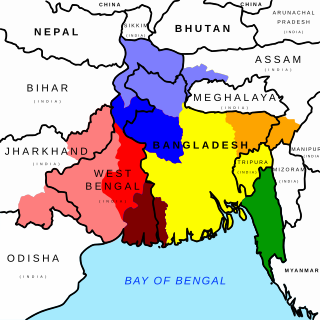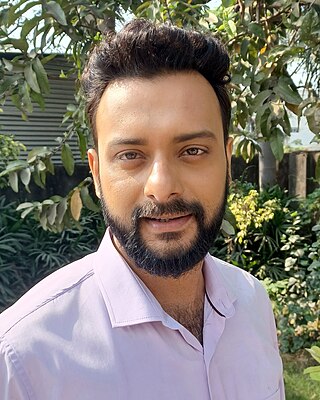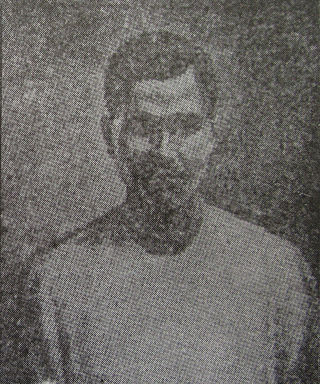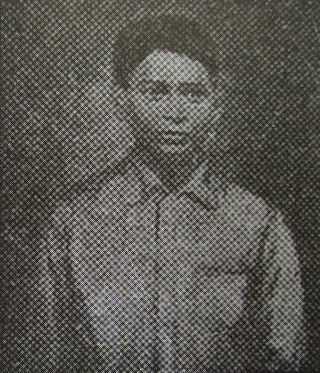Related Research Articles

Bengali music comprises a long tradition of religious and secular song-writing over a period of almost a millennium. Composed with lyrics in the Bengali language, Bengali music spans a wide variety of styles.
Bengali Brahmos are those who adhere to Brahmoism, the philosophy of Brahmo Samaj which was founded by Raja Rammohan Roy. A recent publication describes the disproportionate influence of Brahmos on India's development post-19th Century as unparalleled in recent times.

The Kolkata Police is the territorial police force responsible for law enforcement and crime prevention within the metropolitan area of the city of Kolkata, West Bengal. It is one of the two primary police forces in West Bengal, the other being the West Bengal Police.

The Noakhali riots were a series of semi-organized massacres, rapes and abductions, combined with looting and arson of Hindu properties, perpetrated by the Muslim community in the districts of Noakhali in the Chittagong Division of Bengal in October–November 1946, a year before India's independence from British rule.

Mumtaz Sorcar is an Indian actress and model. She is the daughter of the magician PC Sorcar Junior and Joysri Sorcar. Mumtaz started her career with a music video for singer Mehreen from Bangladesh. She played in the 2010 Bengali film 033, directed by Birsa Dasgupta.
Santipur Assembly constituency is an assembly constituency in Nadia district in the Indian state of West Bengal.

Shunyo E Buke is a 2005 Bengali drama film directed by Kaushik Ganguly. The film deals with the psyche of men and women and their physical relationship. After making Waarish Ganguly made this second feature film and this film did well in Kolkata and was appreciated in few film festivals.
Soham Chakraborty is an Indian actor, producer, television personality and politician. He has appeared in more than 100 Bengali films, as child artist and as male lead. He earned numerous accolades, including Uttam Kumar Awards, BFJA Awards and Star Jalsha Entertainment Awards. Chakraborty has a significant following in West Bengal, Assam and other adjacent states in India and Bangladesh. He is a member of All India Trinamool Congress. He contested 2016 West Bengal Legislative Assembly election from Borjora Constituency. He won the General election 2021 from Chandipur constituency by a margin of 14000 votes. He was sworn in as Member of Legislative Assembly on 2 May 2021.

Jaynagarer Moa is a seasonal Bengali sweetmeat delicacy prepared from date palm jaggery and Kanakchur khoi. This variety of Moa originated in Jaynagar Majilpur of the South 24 Parganas district in the Indian state of West Bengal. It is now a popular sweet, being produced in Kolkata and elsewhere, sometimes with cheaper ingredients and chemical flavours. Jaynagarer Moa was given a Geographical Indication tag in 2015 which will enable the product to be protected from unauthorized uses and piracy.
On 7 June 2013, a 20-year-old college student was abducted, gang-raped and murdered in Kamduni village, 16km from Barasat, North 24 Parganas district about 20km from main Kolkata. In January 2016 the accused were sentenced to death and life imprisonment.

Indrasish Roy is an Indian film and television actor. He played the role of Tintin in serial Gaaner Opare. Later he played the lead role of Chandrakiran Chowdhury, the male protagonist of serial Adwitiya. He debuted in films with Kaushik Ganguly's Rang Milanti. He also won hearts by playing the role of Lalon in Star Jalsha's Dhulokona.

Dark Chocolate is a 2016 Indian Bengali Crime thriller film directed by Agnidev Chatterjee and made under Macneill Engineering studio.

Nirmal Jiban Ghosh was an Indian revolutionary and member of the Bengal Volunteers. He was hanged on 26 October 1934 for the charge of assassination of Magistrate Burge.
The 2007-2008 Nandigram violence was one of the major incidents which saw an alleged involvement of Maoists or more precisely the cadres, armed activists and guerrillas of Communist Party of India (Maoist). Trouble started after the Government of West Bengal led by Left front tried to acquire the agricultural land in Nandigram to allow Indonesia's Salem group to set up a hub for chemical industries. Buddhadeb Bhattacharjee, the then chief minister of West Bengal, accused the Maoists for the violence during the Nandigram. Afterwards, they made a report that was submitted to the then Prime Minister Manmohan Singh. Afterwards in 2014, CPI (Maoists) confirmed that they were active during the Nandigram protests and termed it as "revolutionary people’s agitation".

Anathbandhu Panja was an Indian revolutionary and member of the Bengal Volunteers who carried out assassinations against British colonial officials in an attempt to secure Indian independence.

Brojokishore Chakraborty was an Indian revolutionary and member of the Bengal Volunteers who carried out assassinations of British colonial officials in an attempt to secure Indian independence. He was hanged on 25 October 1934 along with Ramkrishna Roy for the assassination of District Magistrate Bernard E. J. Burge in 1933.

Mrigendra Dutta was an Indian revolutionary and member of the Bengal Volunteers who carried out assassinations against British colonial officials in an attempt to secure Indian independence.

Shanti Gopal Sen was an Indian revolutionary and member of the Bengal Volunteers who carried out assassinations against British colonial officials in an attempt to secure Indian independence.
References
- ↑ "Woman Official lynched in Calcutta". The Statesman. Kolkata. 1 June 1990.
- ↑ Sarkar, Tanika (1991). "Reflections on Birati Rape Cases: Gender Ideology in Bengal". Economic and Political Weekly. 26 (5): 215–218. JSTOR 4397275.
- ↑ Malllick, Shyamadas (9 April 2018). The Whistle and The Hummingbirds. Notion Press. pp. Section 2. ISBN 9781946515810.
- ↑ Ray, Raka (2000). Fields of Protest: Women's Movements in India. Zubaan. p. 99. ISBN 9788186706237.
- ↑ Bandyopadhyay, D (9 October 2010). "Musings of a Pensionjivi on Sumanta Banerjee's Letter". Mainstream Weekly. Retrieved 7 July 2013.
- ↑ Banerjee, Sumanta (18 August 1990). "West Bengal Today: An Anticipatory Post-Mortem". Economic and Political Weekly. 25 (33): 1812–1816. JSTOR 4396636 . Retrieved 17 March 2024.
- 1 2 "Why we must never forget the atrocities, brutal murders and gangrapes in CPM-era Bengal". Firstpost. 15 June 2023. Retrieved 24 December 2023.
- ↑ Sengupta, Sukhoranjan (22 June 1990). "none". Anandabazar Patrika (in Bengali). Kolkata.
- 1 2 Four decades of blood bath in Bengal (2011). Hingsar Utsab (in Bengali). Kolkata: Dip Prakashan. p. 93.
- ↑ "City of Joy to city of rapes: Kolkata sees string of crimes against women" . Retrieved 27 June 2017.
- ↑ "Women, Rape and the Left". Economic and Political Weekly. 26 (5). 5 June 2015.
- ↑ "CM vows justice for rape victims". The Times of India. 14 March 2003. Retrieved 6 September 2017.
- ↑ Ghosh, Sanka (22 November 2022). "'The Red Files': Film Based On 1990 Bantala Rape Case Brings Back Horrific Memories". Times of India.